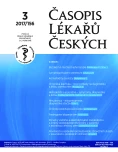-
Medical journals
- Career
Psychological consequences of hair loss
Authors: Zora Dubská
Authors‘ workplace: Dermatovenerologická klinika 3. LF UK a FNKV, Praha
Published in: Čas. Lék. čes. 2017; 156: 147-149
Category: Review Article
Overview
Hair plays an important role in human life. Quantitative or qualitative changes of hair are therefore perceived unfavorably. The psychological consequences of hair loss are described in both androgenic alopecia and alopecia areata. Alopecia areata should be distinguished from other diagnostic units such as trichotillomania. The issue of hair disease requires a multidisciplinary collaboration, in which the dermatologist has a key role to play.
Keywords:
hair function, androgenic alopecia, alopecia areata, trichotillomania
Sources
1. Křemenová S. Psychologie ztráty vlasů a její důsledky pro péči o pacienta. Klinická trichologie. Maxdorf, Praha, 2002 : 94–105.
2. Havlíčková M. Trichotillománie z pohledu dermatologa. Dermatologie pro praxi 2011; 5 : 103–104.
3. Bienová M, Kučerová R. Dermatoskopická diagnostika alopecií. Československá dermatologie 2014; 89 : 3–7.
4. Franklin ME, Zagrabbe K, Benavides KL. Trichotillomania and its treatment: a review and recommendations. Expert Rev Neurother 2011; 11 : 1165–1174.
5. Šantrůčková V, Friedlová M, Chromý K. Případ tělesné dysmorfické poruchy. Psychiatrie pro praxi 2006; 2 : 80–81.
Labels
Addictology Allergology and clinical immunology Angiology Audiology Clinical biochemistry Dermatology & STDs Paediatric gastroenterology Paediatric surgery Paediatric cardiology Paediatric neurology Paediatric ENT Paediatric psychiatry Paediatric rheumatology Diabetology Pharmacy Vascular surgery Pain management Dental Hygienist
Article was published inJournal of Czech Physicians

-
All articles in this issue
- Basal cell carcinoma and the modalities of its therapy
- Lymphogranuloma venereum
- Psoriasis comorbidities
- Chronic urticaria – new views on diagnosis and treatment of disease
- Hidradenitis suppurativa – symptoms, diagnostics, and therapy
- Hirsutism – etiopathogenesis, diagnostics and treatment
- Diseases affecting the scalp
- Androgenetic alopecia in women
- Mesotherapy in trichology
- Psychological consequences of hair loss
- Disorders of water and electrolyte metabolism and changes in acid-base balance in patients with ascitic liver cirrhosis
- Health care provider legal rights and duties connected with the complaints
- The sanctuaries of Asklepios in ancient Athens
- Journal of Czech Physicians
- Journal archive
- Current issue
- Online only
- About the journal
Most read in this issue- Basal cell carcinoma and the modalities of its therapy
- Diseases affecting the scalp
- Hirsutism – etiopathogenesis, diagnostics and treatment
- Androgenetic alopecia in women
Login#ADS_BOTTOM_SCRIPTS#Forgotten passwordEnter the email address that you registered with. We will send you instructions on how to set a new password.
- Career

